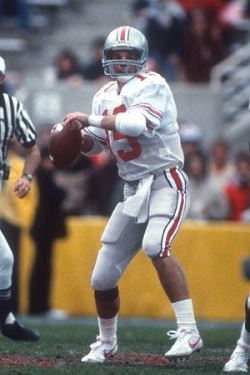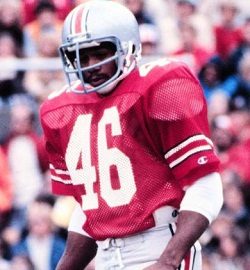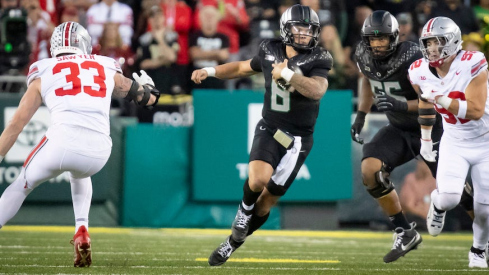 Mike Tomczak: Gaining confidence on the road.
Mike Tomczak: Gaining confidence on the road.For the Ohio State football program, things have been better. In fact, most fans are probably feeling pretty low right now. But, with all due respect to my hero Jack Park, I can remember a time not too long ago when it was worse, at least as far as the team's performance on the field is concerned.
Like the current Buckeye squad, the 1982 Ohio State team began the season with the task of replacing a record-breaking quarterback. However, they had most of their other key offensive performers back and it was thought that sophomore Mike Tomczak would be able to fill in adequately at QB, especially with veteran Gary Williams returning at WR and rising star John Frank returning at TE. With senior tailback Tim Spencer running behind an experienced offensive line and brusing fullback Vaughn Broadnax, the Buckeyes' ground game would more than compensate for trying to break in a rather green signal-caller.
In fact, coach Earle Bruce was much more concerned about his defense after what the team endured the previous season. In 1981, the OSU defense had given up a school record 253 points, and the average opponent point total was the highest since OSU's first season in 1890. The defense against the run was strong, giving up only 95 yards per game, but the inexperienced secondary allowed 273 passing yards per game, leading veteran Columbus Dispatch writer Dick Fenlon to remark "This group couldn't cover a mud puddle with a raincoat."
This record-breaking futility led Bruce to fire secondary coach Nick Saban, along with two other defensive assistants. Randy Hart was brought in to coach the defensive line, Fred Pagac was elevated from grad assistant to full-time linebackers coach, and Tennessee DB coach Dom Capers was hired to take over the OSU secondary. All of the DB's from the previous season returned, but that was hardly a consolation considering their performance. However, Capers was confident that he could straighten them out.
His confidence seemed to be justified in the early going. Ohio State began the season with a home game against Baylor. Predictably, Bruce mostly ran the ball against the physically-outmatched Bears, and the team cruised to a 21-14 victory. Spencer and Broadnax both rushed for over 100 yards and Tomczak was rarely called upon to throw. In week 2, OSU traveled to Michigan State to face a weak Spartan squad and emerged with a 31-10 triumph. Tomczak was shaky in pressure situations, and the team went to halftime tied 10-10, but the defense shut down Sparty in the 2nd half and the ground game dominated the 4th quarter. But a much tougher test was coming in the next few weeks.
In week 3, Stanford rolled into town led by senior All-American QB John Elway. Elway had been out-dualed by OSU's Art Schlichter in Palo Alto the previous season, and he was anxious to make amends. Still, the Buckeye defense held its own and Ohio State stood poised to hold on for a 20-16 win after LB Rowland Tatum intercepted Elway and ran the ball back to Stanford's 25 with just over 2 minutes remaining. However, on 2nd down Bruce called a bootleg pass to Williams in the end zone. The pass was tipped and intercepted by Stanford, and the Cardinal (first year of being singular, rather than the plural "Cardinals") was set up with a classic 2-minute drill scenario to win the game. Foreshadowing what would become his trademark in the NFL, Elway led the team to a go-ahead TD and Stanford left with a 23-20 victory.
The call and the pass were questioned all week long, and things went from bad to worse for Tomczak and Bruce. Tomczak was ineffective again in week 4 against Florida State, and Bruce replaced him with Brent Offenbecher. But after a brief rally, OSU fell to the Seminoles 34-17. Offenbecher started week 5 at home against Wisconsin, but was ineffective again and the OSU offense struggled mightily. The Badgers marched 80 yards for a TD on their first possession but missed the extra point. On a day when rain fell steadily throughout, the Buckeyes were unable to get the running game going and ultimately were shut out 6-0.
At this point, the team was 2-3 and had lost 3 straight at home. The next week they would have to go on the road to face a resurgent Illinois team. The outcry of fans against Bruce was worse than it had ever been, and no one felt confident going into the next game. The quarterback position was a mess, and the ground game seemed to have ground to a halt as every team knew exactly what the Buckeyes were going to do on most plays. It was the lowest point the program had faced since "the punch".
Getting to rock bottom apparently helped Ohio State to find out what they were all about. Bruce invited legendary former coach Woody Hayes to address the team at practice and it seemed to have an effect. They came into Champaign with a renewed confidence and with Tomczak once again at the helm. Bruce began the game aggressively throwing and it paid off as Tomczak connected with flanker Cedric Anderson for a 74-yard touchdown. The renewed passing game opened things up for the running game, and Spencer responded, carrying for 151 yards on the day.
 Tim Spencer rushed for over 1500 yards as a senior.
Tim Spencer rushed for over 1500 yards as a senior.But the Illini were not going to roll over and die. Their passing attack was potent, led by senior QB Tony Eason. Eason had set several conference records the previous season, and he beat out Schlichter to be named 1st team QB on the AP's All-Big Ten team. As OSU took a 21-7 lead into the 4th quarter, Eason rallied his team back to even with two TD passes in the 4th. This set up a two minute drill for the Buckeyes and their young but now-confident QB.
Moving from their own 20, Tomczak led the team down the field to set up a 27-yard Rich Spangler field goal with less than 10 seconds remaining to pull ahead 24-21. With so little time remaining, the Illini kick returner took a knee so that Eason and the offense would have one more snap to try to do something. Unfortunately for him, he was not quite in the end zone when he did it, and so he set his team up with a first down at their own 2-yard line and time enough for only one play. Eason was sacked in the end zone as time ran out and OSU added the safety for a 26-21 win.
Winning had seemed like an impossible task after 3 straight home losses. But after vanquishing the Illini, Ohio State won the rest of their games with ease, including a 24-14 spanking of Big Ten champion Michigan and a 47-17 thrashing of Steve Young's BYU Cougars in the Holiday Bowl. The win over Michigan was particularly satisfying, as it gave them a black eye on their way to the Rose Bowl. In any other season, it would have sealed a championship for the Buckeyes, but this was an odd season where UM played 9 conference games while OSU played 8. As a result, their 8-1 record trumped OSU's 7-1 record and the Wolverines went to Pasadena. The loss must have hurt their pride, because they were dominated by UCLA in the Rose Bowl in a 24-14 loss.
Tomczak would go on to have a fine career at OSU, winning a Big Ten championship as a senior in 1984, despite having broken his leg in the spring and sitting out the first game of the season while still recovering. Eason would go on to become one of the 6 QB's drafted in the first round of the NFL draft, thus helping to create the legendary "class of '83". He would play 7 seasons in the NFL, 6 with the New England Patriots, and would lead the Patriots to the Super Bowl in his 3rd season. Unfortunately, 1985 was not the year to be a young AFC QB in the Super Bowl. His opponent, the 1985 Chicago Bears, had one of the most fearsome defenses ever seen in the NFL. Eason started for the Patriots but would end up not completing a single pass, and was ultimately benched in favor of veteran Steve Grogan. The Patriots lost 46-10, and Eason's performance was rated the worst ever by a starting quarterback in the Super Bowl.

